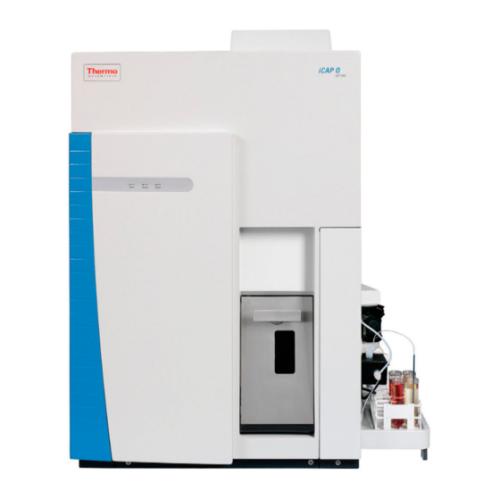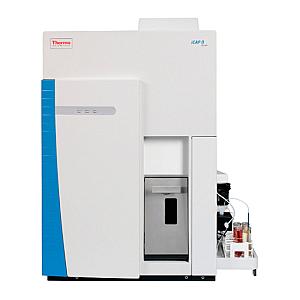The Thermo Scientific iCAP Q is an inductively coupled plasma mass spectrometer (ICP-MS) designed to deliver exceptional analytical performance. This system allows direct analysis of liquid samples and can be combined with other modules for the treatment of gases and solid aerosols. Featuring QCell technology and modes such as CCT and KED, the iCAP Q guarantees high accuracy, low interference and fast performance. Its modular design makes it ideal for laboratories requiring reliable measurements in a variety of environments.
iCAP Q Inductively Coupled Plasma Mass Spectrometer - Good Condition 2014


Offer Details
Accessories :
42104
Options :
Delivery time between 4-6 weeks
Description
Thermo Scientific iCAP Q: An ICP-MS for precision analysis
The iCAP Q from Thermo Scientific is a state-of-the-art inductively coupled plasma mass spectrometer (ICP-MS) designed to provide a comprehensive and reliable analytical solution. This system is intended for laboratories that require highly sensitive and accurate analysis of complex matrices. Thanks to its modular design, it can be adapted to a variety of applications, ranging from environmental analysis to industrial and pharmaceutical applications.
At the heart of the iCAP Q is its optimised sample introduction system, which includes a peristaltic pump, a high-performance nebuliser, a Peltier-cooled spray chamber and a torch with an interchangeable injector. These components ensure efficient nebulisation and increased signal stability. The instrument is also equipped with an ion optics system, including the RAPID lens and QCell collision cell, ensuring optimal ion transmission and significantly reduced interference.
The QCell is a major innovation, enabling the use of Collision Cell Technology (CCT) and Kinetic Energy Discrimination (KED) modes. These functions are essential for eliminating polyatomic interference, ensuring cleaner detection and more reproducible results. The quadrupole mass analyser, combined with a dual-mode detector (secondary electron multiplier), provides unrivalled resolution and accuracy even for the most demanding samples.
The sophisticated vacuum system, consisting of a rotary pump and a split-flow turbomolecular pump, ensures optimal conditions for the operation of the mass analyser and detector. The iCAP Q also integrates gas management features, primarily using argon to generate the plasma and control internal functions. The iCAP Qa, Qc and Qs models offer configurations tailored to specific user requirements.
With its intuitive interface and data acquisition software, the iCAP Q simplifies experiment preparation and result analysis. Its robust design and integrated safety features make it a reliable solution for demanding laboratory environments.
Features
- QCell collision cell for reducing polyatomic interference
- RAPID lens for improved ion transmission and reduced maintenance
- Qtegra software for simplified data acquisition and processing
- Optimised analytical modes for different matrices (aqueous solutions, organic solutions, etc.)
- Efficient cooling for extended stability
- User-friendly interface for quick start-up and complete system control
- Compatibility with external peripherals such as autosamplers and chromatography systems
- Integrated safety features including emergency shutdown and overheating protection
Technical Details
- Mass analyser: High-precision quadrupole with mass/charge filtering
- Detector: Secondary electron multiplier (dual mode)
- Vacuum system: Rotary pump and split-flow turbomolecular pump
- Measurement modes: STD, CCT, KED, STDS, CCTS
- Plasma gas: Argon (input with 3 m pipe supplied)
- Collision cell: QCell, pressurised with helium or gas mixture
- Nebuliser: Polypropylene (PP) or perfluoroalkoxy (PFA) depending on model
- Spray chamber: Quartz or PFA with Peltier cooling
- Injector: Quartz or sapphire, variable internal diameter (2.0–2.5 mm)
- Nominal power: 3750 VA (3500 W effective), 230 V AC ±10%
- Dimensions: Approximately 772 mm (H) x 748 mm (W) x 1200 mm (D)
- Weight: 148 kg (excluding options)
- Temperature range: 15 to 35 °C
Compatible Accessories
- Autosamplers (ESI, ESI FAST, CETAC) and their housings
- NESLAB ThermoFlex 2500 chiller for external cooling
- Dionex ICS ion chromatography systems
- Noise reduction cover and collection tray for the vacuum pump
- Additional gas kits (CCT for Qc and Qs models)
- Installation kit with tools, spare parts and printed manuals